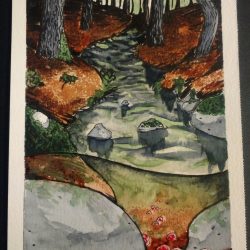Show Notes
Puberty, we recall, is a time of change, and it can be quite dangerous. “The Candy Store” is dedicated to Lawrence Ferlinghetti’s. His poem “The Pennycandystore Beyond the El” was very much in mind while Chris wrote this.
The Candy Store
by Christopher DiLeo
The Eighth Day Brotherhood is a new novel by Alice M. Phillips that should be of interest to PseudoPod listeners. If you want a novel with the milieu of The Stress of Her Regard but tighter pacing, look no further. Couple this with the sensibility of Fincher’s Se7en and you have a tense and relentless thriller. Alice’s love for the tenebrous portions of the Decadent period glows through Paris while the Eiffel Tower rises on the bank of the Seine and as the city prepares of the Exposition Universelle. It manifests with an abiding love for the period supported by an incredible depth of research. Do yourself a favor and pick up this book from Black Rose Writing.
The Eighth Day Brotherhood by Alice M. Phillips — Black Rose Writing
One August morning, in Paris, 1888, the sunrise reveals the embellished corpse of a young man suspended between the columns of the Panthéon, resembling a grotesque Icarus and marking the first in a macabre series of murders linked to Paris monuments. In the Latin Quarter, occult scholar Rémy Sauvage is informed of his lover’s gruesome death and embarks upon his own investigation to avenge him by apprehending the cult known as the Eighth Day Brotherhood. At a nearby sanitarium, aspiring artist Claude Fournel becomes enamored with a mesmerist’s beautiful patient, Irish immigrant Margaret Finnegan. Resolved to steal her away from the asylum and obtain her for his muse, Claude only finds them both entwined in the Brotherhood’s apocalyptic plot combining magic, mythology, and murder.
We want to bring your attention to a project from Orrin Grey and Strix Publishing. You already know and love Orrin Grey.
PSEUDOPOD 155: THE WORM THAT GNAWS
PSEUDOPOD 262: BLACK HILL
PSEUDOPOD 415: NIGHT’S FOUL BIRD
Strix Publishing has launched a Kickstarter to bring us a new and expanded hardcover edition of Orrin’s collection NEVER BET THE DEVIL AND OTHER WARNINGS. This new edition includes all ten stories from the original, as well as the heretofore hard-to-find “A Night for Mothing” and an all new story, “Goblins.” As of the time of this recording, it’s just passed the halfway mark with almost three weeks to go, so it’s time for the add-ons and additional goals to creep out of the corners.
So, please check it out: NEVER BET THE DEVIL AND OTHER WARNINGS Kickstarter. You’ll be glad you did!
The beautiful Horror in Clay 01 – The Murders in the Rue Morgue mug Kickstarter can be accessed at the link! Check it out, for the love of God, Montressor!
The CAST OF WONDERS Flash Fiction Contest info can be accessed at the link.
Info on Anders Manga’s album (they do our theme music!) can be found here.
Pennies jangled in his pockets.
Larry ran along Jamaica Avenue beneath the elevated railway, the bridge stretching on for miles. Cars’s headlights flickered down the corridor, winking like giant eyes.
Dark clouds clotted the afternoon sky, and humidity thickened the September air so that it clung to Larry’s skin, heavy and wet. Mom wanted him back before the storm broke.
No problem.
The Candy Palace was six blocks from home.





